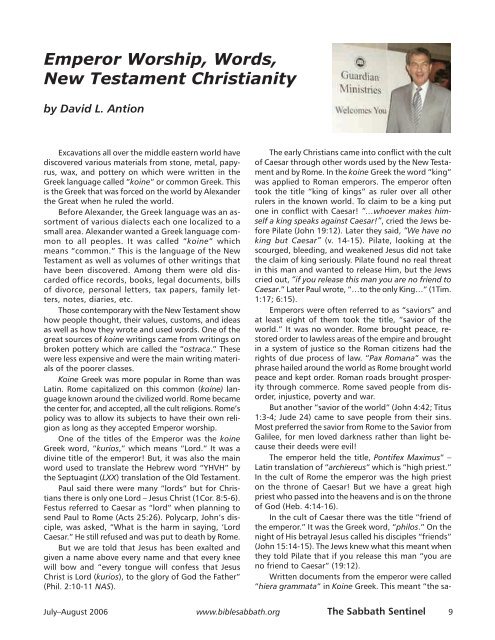The Sabbath Sentinel - The Bible Sabbath Association
The Sabbath Sentinel - The Bible Sabbath Association
The Sabbath Sentinel - The Bible Sabbath Association
Create successful ePaper yourself
Turn your PDF publications into a flip-book with our unique Google optimized e-Paper software.
Emperor Worship, Words,<br />
New Testament Christianity<br />
by David L. Antion<br />
Excavations all over the middle eastern world have<br />
discovered various materials from stone, metal, papyrus,<br />
wax, and pottery on which were written in the<br />
Greek language called “koine” or common Greek. This<br />
is the Greek that was forced on the world by Alexander<br />
the Great when he ruled the world.<br />
Before Alexander, the Greek language was an assortment<br />
of various dialects each one localized to a<br />
small area. Alexander wanted a Greek language common<br />
to all peoples. It was called “koine” which<br />
means “common.” This is the language of the New<br />
Testament as well as volumes of other writings that<br />
have been discovered. Among them were old discarded<br />
office records, books, legal documents, bills<br />
of divorce, personal letters, tax papers, family letters,<br />
notes, diaries, etc.<br />
Those contemporary with the New Testament show<br />
how people thought, their values, customs, and ideas<br />
as well as how they wrote and used words. One of the<br />
great sources of koine writings came from writings on<br />
broken pottery which are called the “ostraca.” <strong>The</strong>se<br />
were less expensive and were the main writing materials<br />
of the poorer classes.<br />
Koine Greek was more popular in Rome than was<br />
Latin. Rome capitalized on this common (koine) language<br />
known around the civilized world. Rome became<br />
the center for, and accepted, all the cult religions. Rome’s<br />
policy was to allow its subjects to have their own religion<br />
as long as they accepted Emperor worship.<br />
One of the titles of the Emperor was the koine<br />
Greek word, “kurios,” which means “Lord.” It was a<br />
divine title of the emperor! But, it was also the main<br />
word used to translate the Hebrew word “YHVH” by<br />
the Septuagint (LXX) translation of the Old Testament.<br />
Paul said there were many “lords” but for Christians<br />
there is only one Lord – Jesus Christ (1Cor. 8:5-6).<br />
Festus referred to Caesar as “lord” when planning to<br />
send Paul to Rome (Acts 25:26). Polycarp, John’s disciple,<br />
was asked, “What is the harm in saying, ‘Lord<br />
Caesar.” He still refused and was put to death by Rome.<br />
But we are told that Jesus has been exalted and<br />
given a name above every name and that every knee<br />
will bow and “every tongue will confess that Jesus<br />
Christ is Lord (kurios), to the glory of God the Father”<br />
(Phil. 2:10-11 NAS).<br />
<strong>The</strong> early Christians came into conflict with the cult<br />
of Caesar through other words used by the New Testament<br />
and by Rome. In the koine Greek the word “king”<br />
was applied to Roman emperors. <strong>The</strong> emperor often<br />
took the title “king of kings” as ruler over all other<br />
rulers in the known world. To claim to be a king put<br />
one in conflict with Caesar! “…whoever makes himself<br />
a king speaks against Caesar!”, cried the Jews before<br />
Pilate (John 19:12). Later they said, “We have no<br />
king but Caesar” (v. 14-15). Pilate, looking at the<br />
scourged, bleeding, and weakened Jesus did not take<br />
the claim of king seriously. Pilate found no real threat<br />
in this man and wanted to release Him, but the Jews<br />
cried out, “if you release this man you are no friend to<br />
Caesar.” Later Paul wrote, “…to the only King…” (1Tim.<br />
1:17; 6:15).<br />
Emperors were often referred to as “saviors” and<br />
at least eight of them took the title, “savior of the<br />
world.” It was no wonder. Rome brought peace, restored<br />
order to lawless areas of the empire and brought<br />
in a system of justice so the Roman citizens had the<br />
rights of due process of law. “Pax Romana” was the<br />
phrase hailed around the world as Rome brought world<br />
peace and kept order. Roman roads brought prosperity<br />
through commerce. Rome saved people from disorder,<br />
injustice, poverty and war.<br />
But another “savior of the world” (John 4:42; Titus<br />
1:3-4; Jude 24) came to save people from their sins.<br />
Most preferred the savior from Rome to the Savior from<br />
Galilee, for men loved darkness rather than light because<br />
their deeds were evil!<br />
<strong>The</strong> emperor held the title, Pontifex Maximus” –<br />
Latin translation of “archiereus” which is “high priest.”<br />
In the cult of Rome the emperor was the high priest<br />
on the throne of Caesar! But we have a great high<br />
priest who passed into the heavens and is on the throne<br />
of God (Heb. 4:14-16).<br />
In the cult of Caesar there was the title “friend of<br />
the emperor.” It was the Greek word, “philos.” On the<br />
night of His betrayal Jesus called his disciples “friends”<br />
(John 15:14-15). <strong>The</strong> Jews knew what this meant when<br />
they told Pilate that if you release this man “you are<br />
no friend to Caesar” (19:12).<br />
Written documents from the emperor were called<br />
“hiera grammata” in Koine Greek. This meant “the sa-<br />
July–August 2006 www.biblesabbath.org <strong>The</strong> <strong>Sabbath</strong> <strong>Sentinel</strong> 9


